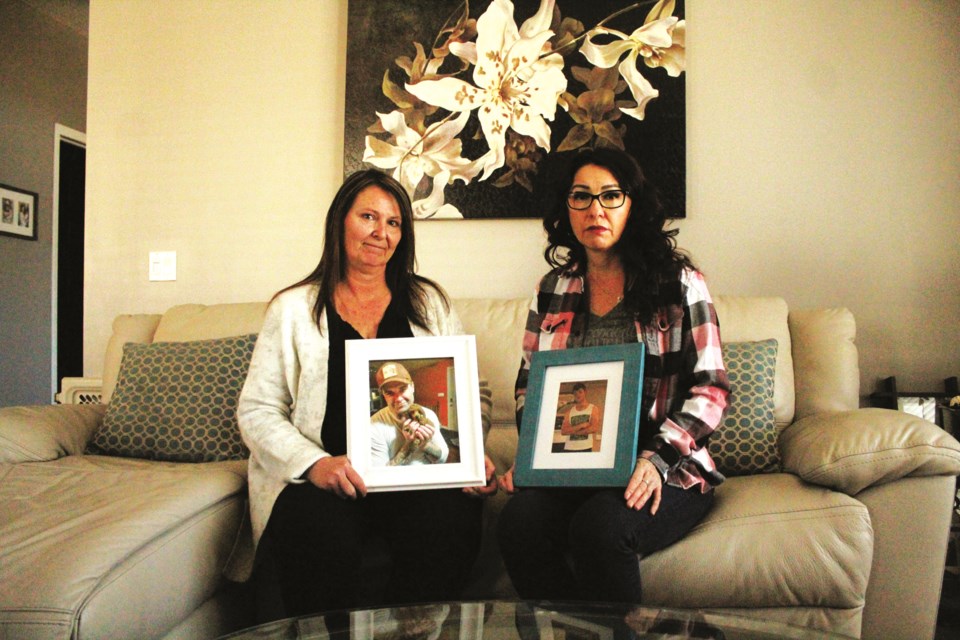The federal government estimates that more than 49,000 Canadians died due to opioid drug overdoses between 2016 and June 2024. In the United States, more than 100,000 died from overdoses in 2024.
While many Canadians question the justification, President Donald Trump cited Canada's role in allowing fentanyl across the line into America as one of his reasons for invoking 25 per cent universal tariffs on Canadian imports earlier this month before putting a pause on the measure for 30 days. Statistics show less than one per cent of fentanyl flowing into the States may come from Canada, with far more coming back across our border from our neighbours to the south.
Nonetheless, Trump has since called on Canada to do more to prevent the flow of fentanyl into the U.S., prompting Prime Minister Justin Trudeau to announce a new intelligence directive on organized drug crime along with strengthening border monitoring measures with helicopters, technology and personnel.
Airdrie friends Julie Hazelwanter and Cheryl Mass can't help but think of their sons as fentanyl dominates political tariff talks and news headlines these days.
Each lost a child to addiction, which is what inspired them to create the Airdrie Overdose Awareness group back in 2021.
Jacob Bulloch, Mass' son, was just 19 when an overdose left him brain dead. She said he turned to opioids as a coping mechanism for his mental health struggles. Hazelwanter said her son, William, struggled with drug and alcohol addictions for more than 20 years until he passed away at the age of 35.
"Not a lot of people want to talk about it - this dirty little secret called addiction," Mass said. "It's becoming like cancer now where every family has someone going through it."
Though Trudeau may have recently followed through on another Trump demand to forestall a U.S. trade war - listing Mexican cartels as terrorists - Hazelwanter feels it is the Trudeau government itself which is largely to blame for the current drug crisis facing Canadians.
"As far as I'm concerned, Trudeau killed those 49,000 people," Hazelwanter said, citing lax borders, the legalization of cannabis, and safe injection programs as amplifiers of the problem - on top of cartels and possible drug labs operating in Alberta and B.C.
She applauded Conservative Party leader Pierre Poilievre's recent pledge to change criminal law so that drug "kingpins" caught with fentanyl are given mandatory life sentences.
"A possible change in government has me hopeful," she said.
U.S. border authorities seized a total of 21,889 pounds of fentanyl in 2024, with barely 43 pounds of it coming from Canada. That roughly equals 0.2 per cent.
While a small amount given Trump's fervour over border security, Hazelwanter said it's still more than enough to be concerned about given that quantity would still be enough to kill millions of people.
"There's so much coming here internationally," Hazelwanter noted. "Through mail. Border crossing. Ports. One place I don't think anyone is talking about is trains, since they don't have to stop when they cross the border. Even right here in super labs in B.C. They have to do more."
Another recent pledge made by Prime Minister Trudeau was to create the position of "fentanyl czar," a person solely dedicated to curbing the illegal flow of the deadly drug.
Both Mass and Hazelwanter thought the position was a step in the right direction, but that whoever ends up taking the role should be chosen carefully.
"I think it should be someone who's lost a child instead of someone who, you know, is coming from the military," Hazelwanter suggested. "Someone who has knowledge to communicate and negotiate from that perspective. Who has the compassion and passion for it."
Both agree the stigma has changed since losing their sons more than five years ago, but that there is still a long way to go - which is why they've held Overdose Awareness Day in Nose Creek park every August.
"We want people to know it's safe to talk and know that they're not the only one," Mass added. "It's a way to get the conversation going. We want to be our kids voice since they can't be here."
Neither knew of any local options in regards to resources, treatment, and overall aid without stigma, learning about the Alberta Adolescent Recovery Centre (AARC), a program for youth struggling with substance abuse, when it was too late.
They now promote AARC as part of their awareness campaign, but Hazelwanter believes it still doesn't go far enough to meet the community's needs.
"There's very few resources here in Airdire," Hazelwanter said. "Some, but not enough."
While Trump's push doesn't give either much confidence on local change, both mothers said change can start with residents. They urged people to carry Naloxone kits, an accessible medication that can reverse opiod overdoses, and to be a bit more understanding of what people suffering from addiction are doing through.
"Everybody has a story and we don't know what they've been through. Their trauma. Their genetics. No one wakes up one day and says I'm going to be an addict," Mass assured. "We just hope to continue to make a difference because helping one person is still way better than helping none."
Anyone wanting support or to help put on Airdrie Overdose Awareness Day this August can contact the group online through www.facebook.com/AirdrieOverdoseAwareness.



